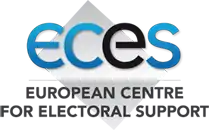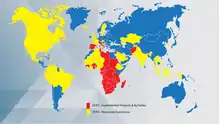European Centre for Electoral Support
The European Centre for Electoral Support (ECES) is a not for profit private foundation, headquartered in Brussels (Belgium) and created in 2010.
 | |
| Formation | 2010 |
|---|---|
| Headquarters | 222 Avenue Louise, Brussels Belgium |
| Monica Fassoni, José Manuel Pinto, Fabio Bargiacchi, Teixeira, Eva Palmans, Lino Francescon, Paulo Marques, José Lambiza | |
Key people | Monica Frassoni, President
José Manuel Pinto Teixeira, Vice President Fabio Bargiacchi, Executive Director |
| Website | www.eces.eu |
ECES promotes sustainable democratic development through the provision of advisory services, operational support and management of large projects in the electoral and democracy assistance field, notably with electoral management bodies, civil society organizations (active in the field of civic and voter education and election observation), political parties, parliaments, media and [[security forces].
ECES is TRACE and ISO 9001 certified for its financial management transparency and Quality Management Systems respectively.
History
The European Centre for Electoral Support (ECES) was launched in December 2010 during the European Development Days forum at the Panel on Democracy and Human Rights organised by the European Commission.
ECES’ co-founders are Abbot Malu Malu and Fabio Bargiacchi. Late Abbot Apollinaire Muholongu Malumalu was the first president of the ECES Management Board from September 2010 until June 2013 when he was re-appointed Chair of the Independent Electoral Commission of DRC before his death.
In 2012, ECES started delivering face-to-face and distance training to the 10 electoral management bodies of the ECCAS (Economic Community of Central African States) and supporting the local elections processes in Libya.
Over the last ten years, ECES has implemented electoral assistance activities in 50 countries across Africa and the Middle East, mostly through the funds of the EU and EU member states.

Strategy
ECES implements its activities through "A European Response to Electoral Cycle Support - EURECS", which is an alternative delivery mechanism to implement electoral and democracy assistance activities that are consistent primarily with European values and EU policies. This practical and long-term approach takes into account the two dimensions of electoral assistance -time and space- and tackles all stages of the electoral cycle.
Key activities
ECES' work focuses on:
- Management of basket funds (EU and other donors)
- Political dialogue
- Crisis management/mediation process with key electoral stakeholders
- Link existing peace-building projects to early warning mechanisms
- Religious networks and association mapping and inter- and intrafaith dialogue, with potential to counteract extremism and radicalisation
- Confidence-building dialogue initiatives (regional, national and community level)
- Advisory support
- Logistics and operational support
- Media monitoring and institutional communication
- Procurement of electoral material
- Development of innovative information and communication technologies (ICTs), user-friendly solutions and applications adapted to electoral support
- Implementation of civic-voter education campaigns
- Design and securitisation of ballot papers
- Transmission of election results
- Production of visibility plans
Collaborations
ECES collaborates with regional organisations and electoral networks, such as: African Union, ECOWAS, ECCAS, CEN-SAD, the RECEF (the Electoral Knowledge Network of the French Speaking countries worldwide), the EPLO (European Peacebuilding Liaison Office), the Indian Ocean Commission (IOC) the ECF-SADC (Electoral Commission Forum of the Southern African Development Community), the ECONEC (Network of Electoral Commissions), the National Electoral Commissions of ECOWAS (the Economic Community of West African States), the Electoral Knowledge Network of the Central African States (RESEAC) and the SADC Electoral Support Network that comprises the platforms of the Civil Society Organisations dealing with Election Observation in the SADC countries.
ECES also partners with the Sant’Anna School of Advanced Studies of Pisa through the Master on Electoral Policy and Administration – MEPA.
ECES is part of a consortium led by the College of Europe to implement the ERMES project (European Response on Mediation Support) to provide a tool for the EU to advance its objectives and role in the field of mediation and dialogue.
ECES is a member of the Federation of European and International Association established in Belgium (FAIB) and is part of the EU Transparency Register and the Transnational Giving Europe Network.
Organisational Structure
ECES has a Management Board and a Management Unit with the Board supervising and setting the strategy and goals of the Management Unit.
These units are complemented by the Quality Support Management Cell, the Coordination, External Relations and Communications Cell and three sections, namely:
- Administration and Finance
- Programmes and Resources Mobilisation
- Operations and Project Implementation
ECES' President is Monica Frassoni, a former Member of the EU Parliament, presently the Co-Chair of the European Green Party and former Chief Observer for the EU Election Observation Missions (Venezuela and Bolivia, appointed by the former EU Commissioner for External Relations, Ferrero-Waldner.
José Manuel Pinto-Teixeira is ECES’ Vice President. He is a former high-level EU official who served as Ambassador of the EU/ Head of Delegation in several countries, including: Cabo Verde, Ukraine, Belarus, Mozambique and Macedonia.
Fabio Bargiacchi is ECES' Executive Director and co-founder.
In September 2020, ECES created a Strategic and Advisory Committee, whose president is Joëlle Milquet, and whose vice-president is Filiberto Ceriani Sebregondi.
Trainings [1]
ECES works mainly in capacity development, through the delivery of the following training:
- The online Master in Electoral Policy and Administration (MEPA), in partnership with Sant’Anna School of Advanced Studies;
- The Leadership and Conflict Management Skills for Electoral Stakeholders - LEAD Training, in collaboration with the Centre for Creative Leadership and delivered in English, French, Portuguese, Spanish and Arabic [2]
- Leadership and Quality Management Skills for Electoral Administratoors (LEAD-Q) trainings;
- Effective Electoral Assistance trainings;
- Building Resources in Democracy, Governance, and Elections - BRIDGE Training [3]
- Training on the Steps of the Electoral Cycle;
- ISO Certification process;
Main Recent Projects
- Prevent, Mitigate and Manage Election-Related Conflict and Potential Violence in Ethiopia - PEV-Ethiopia
- European Response to Electoral Cycle Support in Ethiopia - EURECS Ethiopia
- Support to Democratic Governance in Nigeria (EU-SDGN)
- EU Support to Jordanian Democratic Institutions and Development (EU-JDID)
- Proses - Project in Support of Enhanced Sustainability and Electoral Integrity in Afghanistan
- ERMES - European Resources for Mediation Support
- Prevent, Mitigate and Manage Election-Related Conflict and Potential Violence in South Africa (PEV-SA)
- Ensuring Efficient Investigations and Prevention of Election Fraud
- Prevention and Management of Conflicts and Potential Violence related to Elections in Madagascar (PEV-Madagascar)
- Political participation of women in the Union of Comoros
- Electoral Observation and Democracy Support (EODS PHASE II)
- Project in Support to the Electoral Process in the Republic of Senegal (PAPE Senegal)
- Project in Support of the Credibility and the Transparency of Elections in Burkina Faso (PACTE-BF)
- Project in Support of the Credibility and the Transparency of Elections in Guinea (PACTE-GUINEE)
- Project in Support of the Credibility and the Transparency of Elections in Madagascar (PACTE-MADAGASCAR)
- Project in Support of the Credibility and the Transparency of Elections in Comoros (PACTE-COMOROS)
- Preventing Electoral Violence in the SADC Region (PEV-SADC).
Publications
Delivering Electoral and Democracy Support under COVID-19 (2020)
This paper informs on the response developed amid the health crisis in the field of electoral assistance.
Reflections on Election Conflict and Violence Prevention: Lessons from Southern Africa
On August 29, 2018, ECES’ Executive Director, Fabio Bargiacchi, and ECES’ Senior Election Conflict Management Advisor, Victoria Florinder, were invited at pre-workshop of the American Association of Political Science (APSA) titled “New Challenges in Electoral Management, Building Better Elections”. The workshop occurred in Boston at the Massachusetts Institute of Technology (MIT) and was organized by the Electoral Management Network, the Electoral Integrity Project and the MIT Election Data and Science Lab (MEDSL).
As part of the panel that focused on the topic “Mitigating Electoral Violence”, ECES launched the handbook “Preventing and mitigating electoral conflict and violence: lessons from the Southern Africa” and presented on the lessons learned and the experience gained during the implementation of the PEV SADC project (2013-2017), funded by the European Union.
Preventing and Mitigating Electoral Conflict and Violence - Handbook
This handbook was conceived by ECES and the Election Support Network of Southern Africa (ESN-SA), with the support of many of its 16 members in the 14 countries comprised by the PEV SADC project. It is the result of an extensive research exercise carried out by ECES and ESN-SA, in the framework of the regional EU-funded project for the prevention of election related violence in the Southern African Development Community (SADC).
The potential of EU Funded electoral assistance to support the prevention of election related conflict and violence: Lessons from the Southern African Region (2017)
The paper is the result of some of the most significant experiences and lessons learned from the implementation of the project “Preventing Electoral Conflict in the SADC region” (PEV-SADC), implemented by ECES, and funded at 75% by the EU and 25% by ECES. The information and material contained in the paper are the product of collaboration and researches carried out by ECES in partnership with the Election Support Network of Southern Africa (ESN-SA).
A European Response to Electoral Cycle Approach - EURECS (2016)
The paper was presented by ECES President, Monica Frassoni, during the International Day of Democracy celebrated at the European Parliament.
The European Response to Electoral Cycle Support was conceived by ECES and the European Partnership for Democracy (EPD), in order to provide the EU, EU member states, donors and beneficiary countries with a delivery mechanism devised to implement electoral and democracy assistance activities, in line with European values and policies and consistent with the recommendations formulated by EU Electoral Observation Missions.
Funding
The EU and its Member States are the largest donors of ECES. The EU funds come from different financial instruments, including:
- European Development Fund
- Instrument contributing to Stability and Peace
- European Neighbourhood Instrument
- European Instrument for Democracy/Human Rights
- Development Cooperation Instrument.
ECES has also received funds from over 20 donors.
Notes
- "Where to get trained as an Electoral Observer". Election observation. 2015-01-15. Retrieved 2016-11-10.
- "CCL Collaborates with the European Center for Electoral Support | Leadership Explorer Tools". www.leadingeffectively.com. Retrieved 2016-11-10.
- Pública, Consell de Diplomàcia. "DIPLOCAT - Election Observation Training". www.diplocat.cat. Archived from the original on 2016-11-10. Retrieved 2016-11-10.
References
http://www.aceeeo.org/hu/node/191
https://sites.google.com/site/electoralintegrityproject4/links2
http://www.ispionline.it/it/ispi-school/course-typologies/advanced-diploma/ad-electoral-assistance
https://www.electoralnetwork.org/index.php/user/members
http://phys.org/news/2014-06-satellites-rural-africa.html
http://www.collateralcreations.com/Video-soutien-a-la-democratisation?lang=en
http://cesko.ge/eng/static/408/mexute-yovelwliuri-shexvedra-2015